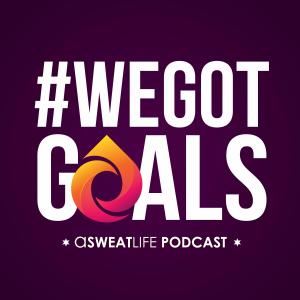#WeGotGoals by aSweatLife

A Deep Dive into Diet Culture with Savala Nolan, Author of "Don't Let It Get You Down"
Content warning: In this episode, we’re going to be discussing eating disorders and diets. There’s also a brief mention of sexual assault. If those aren’t topics you’re ready to listen to, skip this one and come back.
Speaker, lawyer and writer Savala Nolan was put on her first diet at four years old. That means someone who thought they were protecting her from the world instead taught her that the world would not be friendly to her body. That's an idea that so many human beings internalize early in life - kids are smart and they're always watching.
She shared a look at some of the ways she tried to change her her body and shame her body into submission in an early version of an essay that ended up in her book Don't Let It Get You Down.
We're wrapping up our month-long deep dive into diet culture on our podcast #WeGotGoals with a conversation featuring Savala Nolan. In her book, she shares perspectives on intersectionality as a woman who has a mixed-race identity, who came from poverty, but also experienced wealth, who has lived in both a thin body and a fat body.
And she shares openly the ways that the prism of identity shapes and shades the world and how she’s learned from dating, working, going through a traumatic labor and delivery, and raising a daughter. And she shares how she inevitably quit dieting too.
This interview with Nolan represents a point that's important to make in a conversation about diet culture: that the driving force behind diet culture is fatphobia, and, as Nolan argues with solid historical evidence in a piece for Health, fatphobia is rooted in racism.
That theme also shines through in her book, which I ready from cover-to-cover over a weekend. Three essays in particular speak to diet culture in Don’t Let It Get You Down, titled "The Body Endures," "Fat in Ways White Girls Don’t Understand," and "Little Satin Bomber Jacket."
The book and our interview get into topics on poverty, race, diet-culture and fatphobia and if my hearty recommendation of the book isn't enough, you don't have to take my word for it.
The New York Times Book Review calls it “[A] standout collection...a brutal, beautifully rendered narrative.”
The San Francisco Chronicle said is "[Written with] unflinching honesty that is both revelatory and unsettling”
“A vibrant and thoughtful collection.” —Roxane Gay
Resources:
- Buy her book Don't Let It Get You Down wherever you get your books
- Use this handy discussion guide for the book Don't Let It Get You Down
- Savala mentions this importance of the social determinants of health, here's a look at those
- We discuss the difference between body neutrality and body positivity
- Ready the piece in Health we discussed, "The reason my disordered eating went unnoticed by almost everyone"
- This piece in Vogue appears in the book as well, with a few additional details as Savala gained access to archives "Say Their Names: Breonna Taylor, My Great-Great-Grandmother, and Me"
- This piece in TIME also appears in the book and is deeply sad, "My Father's Life Was Shaped by Racism. So Was His Death"
Other episodes in this deep dive on Diet Culture:
- Dr. Lindo Bacon shares the research that led to Heath At Every Size
- Judith Matz explains more on the psychology of your body on a diet
- Dr. Alexis Conason on living diet-free
Some FAQs
- What’s a diet? Any time you make a change in how you eat for the purpose of weight loss.
- What is diet culture? A belief that thinness is a moral virtue and thinness is health. Therefore, it’s worth doing anything to achieve that status and when you get to that status, you’ll be happier and healthier.
- What exactly is obesity? And should you use that word when talking about someone else’s weight? In short, it’s complicated, based on the BMI *which has its own problems* and no. Here’s more research on the words we use and weight stigma.
- Why did we choose to use the word “fat”? The word fat is being reclaimed by many – especially those within the fat acceptance movement. To some, this word is loaded and will remain loaded; we want to honor that and we understand that. If we could address everyone on a 1:1 basis, we would use your words of choice (like Dr. Conason talks through). More on the word fat.






 Visit Podcast Website
Visit Podcast Website RSS Podcast Feed
RSS Podcast Feed Subscribe
Subscribe
 Add to MyCast
Add to MyCast